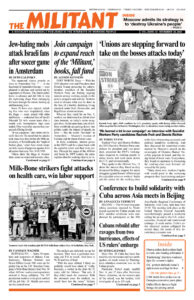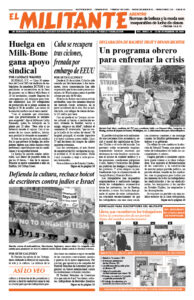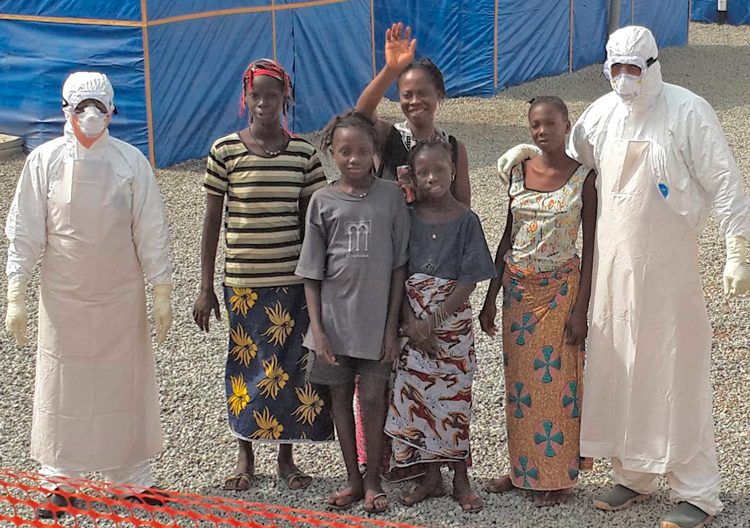Red Zone: Cuba and the Battle Against Ebola in West Africa by Enrique Ubieta Gómez is one of Pathfinder’s Books of the Month for November. Earlier Ubieta visited remote areas of Central and Latin America and the Caribbean to cover the work of Cuba’s internationalist doctors and nurses there. In this book, he relates how Cuba’s revolutionary government responded to calls for help during the 2014 deadly Ebola virus outbreak in West Africa, sending 256 medical volunteers. Their exemplary courageous and hands-on help for thousands helped eliminate the epidemic. The excerpt is from the preface. Copyright © 2019 by Pathfinder Press. Reprinted by permission.
Red Zone: Cuba and the Battle Against Ebola in West Africa is not a book about doctors, epidemics, or medical care, as central as those topics are to the remarkable account you are about to read. First and foremost, the book is “about the solidarity and internationalism that are at the heart of the Cuban Revolution,” as author Enrique Ubieta told the audience at its launching in Havana in February 2016.
In August and September 2014, the World Health Organization and the governments of three West African countries, Liberia, Sierra Leone, and Guinea, issued international calls for help in combating the largest epidemic on record of the deadly Ebola virus. In contrast to the meager and callously self-serving response of capitalist powers, especially the United States, France, and the United Kingdom, Cuba’s revolutionary socialist government acted rapidly.
Within three days of a call to Cuban president Raúl Castro from Ban Ki-moon, secretary-general of the United Nations, more than 12,000 Cuban medical professionals had volunteered, many with experience responding to epidemics and disasters from Haiti to Pakistan to Central America. Of those volunteers, 256 Cuban doctors, nurses, and health care technicians were selected and trained for the mission.
Eight months later, when the last member of the Cuban medical brigade returned home in May 2015, the Ebola epidemic in West Africa had been virtually eradicated. …
The Cuban volunteers in West Africa were part of the Henry Reeve International Contingent, launched in September 2005. President Fidel Castro initiated the contingent that year in response to Hurricane Katrina. The hope was they would be allowed to provide assistance to residents of New Orleans and the surrounding Louisiana bayous devastated by the storm.
The US government, however, flatly rejected Cuba’s offer to send 1,500 medical personnel to help. Instead, Washington brutally left working people there to fend for themselves, knowing full well that medical attention, food, and water were woefully lacking.
“Cuba’s ‘army of white
coats,’ as Fidel Castro
called them in 2014,
acts in stark contrast to
capitalist medicine…”
This contempt for working people’s lives and welfare on the part of the wealthy US capitalist families — and of the government and twin political parties through which they exercise their exploitation and class rule — has been repeated many times over, both before and after Katrina. …
While many such occurrences are natural in origin, the catastrophic social consequences for tens and hundreds of millions are a product of capitalism. …
Cuba’s “army of white coats,” as Fidel Castro aptly called them in 2014, acts in stark contrast to capitalist “medicine.” Serving in 64 countries, these volunteers often work and live in the most remote rural regions or worst-off urban working-class neighborhoods. These are areas that profit-maximizing hospitals and “health-care” conglomerates stay as far away from as possible. As do most physicians who graduate from medical school in the capitalist world, convinced that their diplomas entitle them to big bucks and the best comforts their class privilege can offer.
The goal of Cuba’s internationalist cooperation is not simply to provide needed medical personnel where none currently exist. The Cuban government strives to contribute to building a medical infrastructure in these countries wherever possible, helping establish medical schools in some countries, bringing students to Cuba for medical training at little or no cost, and assisting in developing networks of primary care clinics.
Cuba’s revolutionary government has extended medical assistance to countries with which it doesn’t have diplomatic relations as well. That was the case, for example, when 2,400 doctors, nurses, and others went to the mountainous Kashmir region of Pakistan in 2005 following the 7.6 magnitude earthquake that killed some 80,000 human beings there. Cuban medical volunteers set up 30 field hospitals, later donated to the Pakistan government. Cuba provided 1,000 scholarships to students in the region to study at the Latin American School of Medicine in Havana.
Like other missions abroad, the fight against Ebola was a learning experience for the Cuban medical personnel involved. This was especially true for younger brigade members, who have never themselves (nor, as years go by, their parents or even grandparents) lived or worked under the dog-eat-dog social relations bred by capitalist exploitation and rendered even more brutal by imperialist oppression.
In Red Zone, Ubieta said at the 2016 launching, “I write about the seeds we are sowing inside and outside of ourselves. Every time a Cuban doctor takes part in a mission abroad, they renew themselves as revolutionaries.”
Some people contend “that the epic moments of the Cuban Revolution are a thing of the past,” Ubieta noted, and “that Cubans should concern themselves only with their own individual, everyday problems, which can sometimes be overwhelming.
“And then suddenly you hear the battle cry, like the request we received for aid. And thousands turn out, volunteering to go. Solidarity is very much alive in the Cuban people.”


